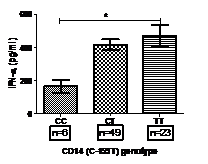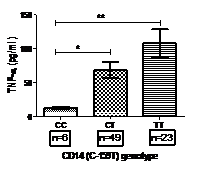Session Information
Date: Sunday, November 8, 2015
Session Type: ACR Concurrent Abstract Session
Session Time: 4:30PM-6:00PM
Background/Purpose:
Cluster of differentiation 14 (CD14) plays an important role in innate
immune system as a co-receptor in TLRs (2, 4, 7 and 9) signaling. Host innate
receptor TLR7 and 9 recognizes nucleic acids as a ligand and produce type I IFN
which is believed to be associated in the pathogenesis of SLE. TLR7 and 9
require CD14 for effective signaling, we hypothesized that CD14 polymorphism
and soluble CD14 levels would correlate with disease susceptibility and disease
activity in SLE.
Methods: In
a case control hospital based study, 130 female SLE patients fulfilling the ACR
criteria and 140 age, sex matched healthy controls were enrolled. CD14 (C-159T)
polymorphism was genotyped by PCR-RFLP. In 78 SLE patients and 46 healthy
controls plasma sCD14, TNF-α, IFN-α levels were quantified by ELISA. Clinical,
serological and other markers of disease activity (C3, C4 and anti-dsDNA) were
measured by standard laboratory procedures.
Results: Prevalence
of mutant genotypes (CT and TT) and allele T were significantly higher in
patients of SLE. Mutants (CT and TT) for CD14(C-159T) polymorphism were
associated with higher plasma sCD14, IFN-α and TNF-α compared to wild
type CC. Plasma sCD14 levels were significantly high in SLE patients compared
to healthy controls (P<0.001).Plasma sCD14 correlated with SLEDAI(P = 0.002,
r = 0.34), proteinuria (P=0.001, r = 0.34) and negatively correlated with C3 (P
= 0.003, r = -0.33) and C4 (P < 0.0001, r = -0.50). Patients with lupus
nephritis displayed higher plasma levels of sCD14, and IFN-α
Conclusion: CD14
(C-159T) polymorphism is associated with SLE. Higher soluble CD14 levels is
significantly associated with SLE disease activity and lupus nephritis making
it a promising biomarker.
Association
of CD14(C-159T) polymorphism with plasma sCD14, IFN-α and TNF-α.
Plasma
concentrations (mean ± standard error of mean) of sCD14, IFN-α and TNF-α
were measured by commercial kit. Plasma of 78 SLE patients were quantified for sCD14
(A), IFN-α (B) and TNF-α (C) and correlated with CD14(C-159T)
polymorphism. Numbers of samples from each genotype are shown in box. Mean
plasma levels in different genotypes were compared by Kruskal-Wallis test
followed by Dunns post test. P value less than 0.05 was considered as
significant. *P<0.05, **P<0.01, ***P<0.001
To cite this abstract in AMA style:
Pattanaik SS, Panda AK, Sahoo RR, Tripathy R, Das BK. CD 14(C-159T) Polymorphism and Soluble CD14 Are Associated with Increased Disease Activity and Nephritis in SLE [abstract]. Arthritis Rheumatol. 2015; 67 (suppl 10). https://acrabstracts.org/abstract/cd-14c-159t-polymorphism-and-soluble-cd14-are-associated-with-increased-disease-activity-and-nephritis-in-sle/. Accessed .« Back to 2015 ACR/ARHP Annual Meeting
ACR Meeting Abstracts - https://acrabstracts.org/abstract/cd-14c-159t-polymorphism-and-soluble-cd14-are-associated-with-increased-disease-activity-and-nephritis-in-sle/



